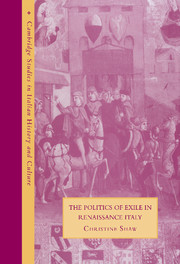Conclusion
Published online by Cambridge University Press: 31 July 2009
Summary
Political life in Renaissance Italy was endlessly various and rich in incident. There were so many political communities, so many outstanding personalities, so much happening, that it can seem chaotic, and hard find a thread to provide a guide through the maze.
Two of the most important lines of interpretation that historians have used to aid them in trying to make sense of it all have a bearing on the question of the role of political exiles in the political life of Renaissance Italy. One concerns the internal politics of towns and cities, the other relations between states. The first is the restriction in the numbers of those considered qualified to participate in political life, to the exclusion of the less prosperous, and the closing of access to these elites, who came to perceive themselves as nobles – a process known rather inelegantly in Italian as ‘aristocratizzazione’. This was a long-term development, proceeding at different speeds and different rhythms in different communities, and it was not confined to the second half of the fifteenth century – but was it contributing to the large numbers of exiles in this period? The second line of interpretation, one which has focused particularly on the second half of the fifteenth century, raises the question of the extent to which there was a conscious effort by the Italian powers to keep the peace among themselves (and keep foreign powers out of Italy) by maintaining a balance of power that foreshadowed the ‘balance of power’ politics among the states of Europe.
- Type
- Chapter
- Information
- The Politics of Exile in Renaissance Italy , pp. 234 - 239Publisher: Cambridge University PressPrint publication year: 2000
- 1
- Cited by



